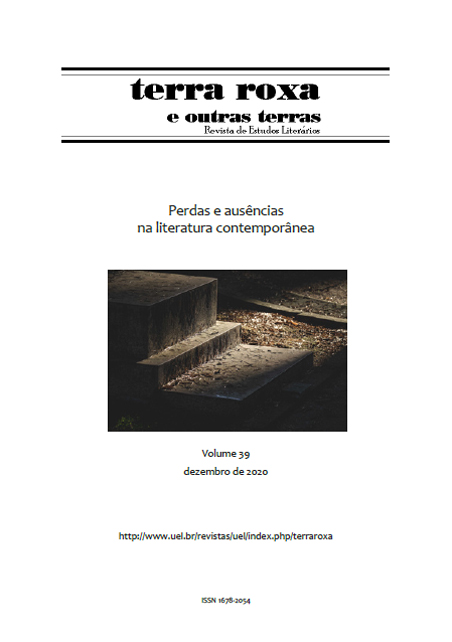Between losses and repetitions: the traumatic realism in Barba ensopada de sangue by Daniel Galera
DOI:
https://doi.org/10.5433/1678-2054.2020v39p36Keywords:
Brazilian Novel, Daniel Galera, Barba Ensopada de Sangue, Traumatic RealismAbstract
This article proposes a reading of Barba Ensopada de Sangue (2012), a novel by Daniel Galera, which starts from its ties with realist tradition, reverberating on contemporary Brazilian literature, to investigate some marks of traumatic realism in the narrative, especially the established repetitions between the protagonist and his grandfather. To this end, I visited Schøllhammer (2013) on the marks of realism in Brazilian prose, Ginzburg (2002) on the repercussion of trauma aesthetics in Brazil, and Foster (2017 and 2020) on traumatic realism as an essential category for understanding contemporary. The theme of loss is pivotal in the novel, seen as trauma simultaneously repeated and displaced, and its relationship with a pattern of masculinity that insists on resurging. The importance of the Beta dog is highlighted along with the narrative as a symbolic figure stressing the parallelism to prevent the repetition pattern from becoming a simple copy.Downloads
References
FERREIRA JÚNIOR, Nelson Eliezer. Virilidade e identidade narrativa em Mãos de cavalo, de Daniel Galera. Acta Scientiarum. Language and Culture, Maringá, v. 42, n. 2, p. e50843, 8 jul. 2020. DOI: 10.4025/actascilangcult.v42i2.50843.
FOSTER, Hal. O retorno do real: a vanguarda no final do século XX. São Paulo: Edu, 2017.
FOSTER, Hal. What comes after farce?: art and criticismo at time of debacle. New York: Verso, 2020.
GALERA, Daniel. Barba ensopada de sangue. São Paulo: Companhia das Letras, 2012.
GALERA, Daniel. Mãos de cavalo. São Paulo: Companhia das Letras, 2006.
GINZBURG, Jaime. “Ditadura e estética do trauma: exílio e fantasmagoria”. F. J. G. Correia, org. O rosto escuro de narciso. João Pessoa: Ideia, 2004. 53-62.
LUKÁCS, Georg. A teoria do romance: um ensaio histórico-filosófico sobre as formas da grande épica. São Paulo: Duas Cidades; 34, 2000.
SCHØLLHAMMER, Karl Erik. Ficção brasileira contemporânea. Rio de Janeiro: Civilização Brasileira, 2009.
SCHØLLHAMMER, Karl Erik. Para uma crítica do realismo traumático. SOLETRAS, Rio de Janeiro, n.23, p. 19-28, 2012. DOI: 10.12957/soletras.2012.3801
TAKEDA, Anna Carolina Botelho. A obsessão pela virilidade em Mãos de cavalo: poder e ruína. Revista Estação Literária, Londrina, v. 16, p. 153-164, jun. 2016. http://www.uel.br/revistas/uel/index.php/estacaoliteraria/article/view/28503/20650.
XAVIER, Luiz Gustavo Osório. Homens à deriva: a representação da masculinidade em dois romances de Daniel Galera. Dissertação (Mestrado em Letras e Linguística), Universidade Federal de Goiás, 2020. http://repositorio.bc.ufg.br/tede/handle/tede/10497.
Downloads
Published
How to Cite
Issue
Section
License
Authors who publish in this journal agree to the following terms:
a) The authors retain the copyright and grant the journal the right of first publication, the work being simultaneously licensed under the Creative Commons Attribution-NonCommercial 4.0 International License, allowing the sharing of the work with acknowledgment of the authorship of the work and initial publication in this journal.
b) Authors are authorized to assume additional contracts separately, for non-exclusive distribution of the version of the work published in this journal (eg, publish in an institutional repository or as a book chapter), with acknowledgment of authorship and initial publication in this journal.
c) Authors are allowed and encouraged to publish and distribute their work online (e.g. in institutional repositories or on their personal page) after the editorial process, as this can generate productive changes as well as increase impact and citation of the published work (See The Effect of Open Access).
d) The authors of the approved works authorize the journal to, after publication, transfer their content for reproduction in content indexers, virtual libraries and the like.
e) The authors assume that the texts submitted for publication are of their original creation, taking full responsibility for their content in case of any objection by third parties.



















